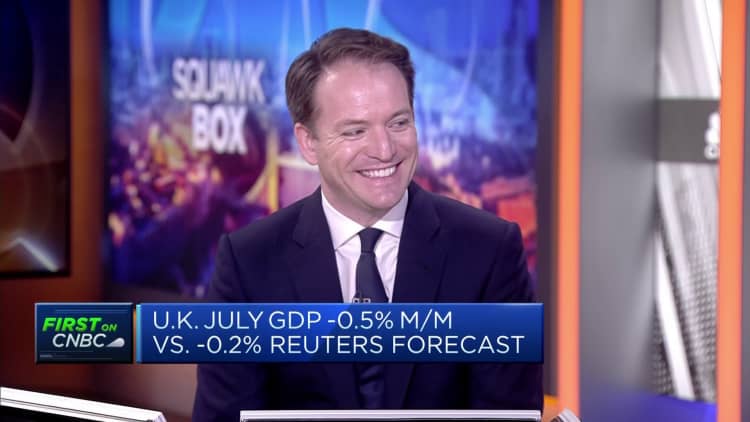UK economic recovery picks up steam, overtaking ‘sick man’ Germany — for now


Skyscrapers in the Canary Wharf financial, business and shopping district in London, UK.
Bloomberg | Bloomberg | Getty Images
LONDON — The U.K.’s economic performance since the start of the Covid-19 pandemic has surpassed that of France and Germany, according to new data revisions published on Friday.
The Office for National Statistics revealed that by the end of the second quarter, the British economy was 1.8% larger than in the final quarter of 2019, the last full quarter before the onset of the pandemic.
A previous ONS estimate in August had suggested that U.K. GDP was still 0.2% below pre-pandemic levels, making it the slowest recovery among advanced economies.
France’s economy is currently 1.7% higher than in the fourth quarter of 2019, while Germany — now described by some economists as the “sick man of Europe” — is hovering just 0.2% above pre-pandemic levels.
British Finance Minister Jeremy Hunt said in a statement Friday said the revised data “once again proves the doubters wrong.”
“The best way to continue this growth is to stick to our plan to halve inflation this year, with the IMF forecasting that we will grow more than Germany, France, and Italy in the longer term,” he added.
Second-quarter GDP growth is estimated to have grown by 0.2% in the second quarter, while first-quarter growth was revised upwards to 0.3% from a previous estimate of 0.1%.
Still a ‘flatlining economy’
The U.K. economy has proven surprisingly resilient so far. However in a bid to rein in sky-high inflation, the Bank of England has hiked interest rates from 0.1% to 5.25% since December 2021, and this monetary policy tightening is in the early stages of feeding through into the real economy.
“Unfortunately this snapshot of economic data is not significant enough to change the overall picture of a flatlining economy,” said PwC economist Jake Finney.
“Output is only 0.4% higher than where it was at the same time a year ago. If anything, the GDP data revisions may marginally dampen the U.K.’s growth prospects for 2023 and 2024 as they reduce the potential for bounce-back growth.”
PwC expects growth to remain sluggish while monetary tightening continues to weigh on activity, and projects that annual GDP growth will remain “significantly below trend” this year and next.
U.K. GDP contracted by a deeper-than-expected 0.5% month-on-month in July, and Finney suggested that alongside recent PMI readings, a slight contraction may be on the cards for the third quarter.
Pain delayed
Richard Carter, head of fixed interest research at Quilter Cheviot, said Friday’s data offers some hope that the U.K. may avoid recession, while signs are emerging that the country’s cost-of-living crisis may be easing for households.
“While expenses are still elevated compared to pre-pandemic periods, disposable incomes are beginning to move ahead, bringing relief to many households who will have struggled over the winter months and where excess savings from the pandemic have dried up,” he said in an email Friday.
“However, given the speed of interest rate rises and the cumulative effect of the cost of living crisis, it may just be a case of the pain being delayed, with 2024 looking more challenging.”
The Bank of England has been walking a tightrope between containing inflation and the risk of tipping the economy into recession, while the U.K. will also be navigating a general election in 2024. Carter suggested policymakers may be wary of overcorrecting on rates and tipping the balance of power.
“With rates expected to say higher for longer and no sign of when to expect the first cut to rates, consumers will continue to be buffeted by the economic headwinds,” he said.
“The economy may be holding up just now, but it is asking a lot for to continue to do so for quite so long.”









